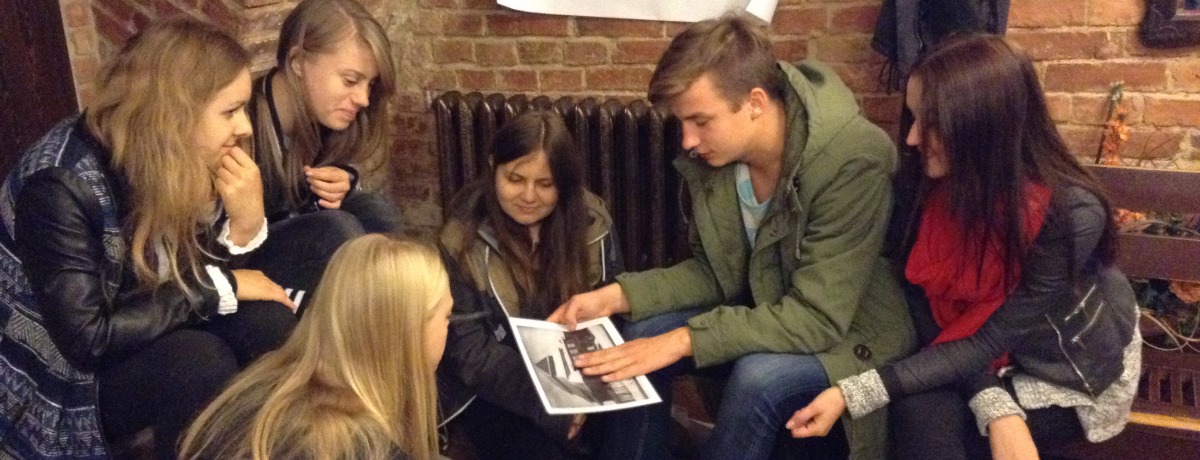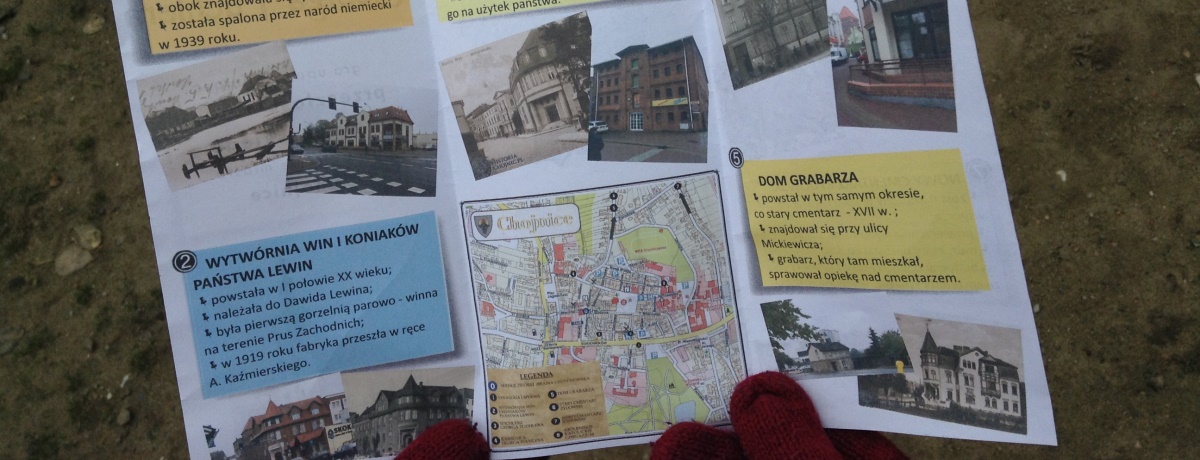| 2015 |
Chojnice
Philomaths High School


| 2015 |
2nd Award at 2015 School of Dialogue Gala
Chojnice is a town in Pomorskie Province with around 40,000 residents. The nationality of town residents would change over the centuries. The town was incorporated into the state of Teutonic Order, later it was part of the lands of Prussian Confederation, and after it belonged to the Kingdom of Poland. During the partition of Poland it passed under the Prussian rule, and afterwards it was incorporated into the Second Republic of Poland. It all had a significant impact on the life and fate of the local Jewish community. The first Jews settled in Chojnice in the middle of the 17thcentury, yet a greater influx of Jews to Chojnice took place at the end of the 18th century. In 1813 the town was inhabited by 80 Jewish families and a Kahal was already formed, with its own wooden synagogue (that was replaced with a new one in 1869); in 1828, the town already had a Jewish elementary school. Despite anti-Semitic actions and riots in 1881, as well as the burning of the synagogue in 1884, the community continued to develop until 1900, when a pogrom was organized in Chojnice. Ernst Winter, a local junior high student , was murdered. Mounting accusations led to riots so intense that the situation called for an army intervention. The army entered the town, Jews left, with only half of the community deciding to stay behind. The new settlers came after 1920. Chojnice, previously a German town, became part of Poland and assimilated Jews left for Germany. And so, in 1931 only 65 members of the local Jewish community were left, of whom 58 lived in the town proper, with others scattered around the villages. They worked in commerce, were landlords, ran different workshops. They were also farmers and cultivated the land. One owned a foundry, another was a miller. There was a butcher shop, a cheap bazaar, iron warehouse and a textile shop.
Right before the war most of the Jews moved to central Poland. Some of those who were left were murdered along with other residents in October 1939 on Igielskie fields. 15 Jewish men and women, including one Jewish child. Those who were spared were transported to the General Government.
Not much is left after Jews of Chojnice. It’s hard to spot any traces of the two Jewish cemeteries. Only a wall is left from one, while the other still has the undertaker’s house and chevra kadisha left; the latter is now used as a residential building. Not a trace remains of the synagogue that was blown up into the air already in 1939. School of Dialogue educators Zosia Waślicka and Agata Jadowska met the local students a few times throughout October and November of 2015. They talked to students about the history of their town and about themselves: what Chojnice used to look like, what this means to students, does it somehow influence their identity and attitudes towards the city they call their own.
Students collected information, had working meetings in the local Pedagogical and Scientific libraries, a few female students even visited the State Archives in Bydgoszcz. Another group met with Mr. Kazimierz Ostrowski, local historian, who took them for a walk around sites that are somehow connected to Jewish history of Chojnice. He recommended information sources helped establish which findings are true and which should be treated with caution. Students would meet after school, wondering where else to look for information. They wrote letters to potential sponsors and – with the help of the town mayor – identified the date to hold their event. A few days before their organized their tour, students organized two happenings to advertise it. They stood with banners they received from one of the local printing houses; the banners read “Jewish past = Chojnice past” and “Education for Tolerance”. They handed out balloons, candy and leaflets informing about the tour they were going to organize. They asked passersby what and if they know anything about Jews of Chojnice. Another printing house provided posters advertising the walking tour. In 70 copies. Chojnice Region Promotion Office hanged them around town and distributed them to residents.

The local website Chojnice24.pl posted a news item. Word got around, information spread through word-of-mouth. Students sent out invitation to everyone who helped organize the event; they printed brochures, bound them and distributed them around town; in Polish, English, German and Kashubian (language of the region). They introduced final amendments, conducted a series of test tours and a few girls went to the local radio to talk about School of Dialogue, their idea for the project, why they are doing it and why they invite everyone to join. Right before the walking tour that would take the form of an location-based game, students were collecting ordered challah breads, awards for the tour’s contests, and putting final touches. At 4PM they met with tour participants in Chojnice Town Moat. There were about 100 participants: school students, scouts, senior citizens. Participants were divided into 7 groups, with each group getting a map with a different route. Groups would approach different stops, where students already waited for them to talk history and show various props. Groups were given tasks to solve for which they would be awarded points. Then they would move on to the next stop. “Following Georg Tuchler” was the title of the tour. Georg Tuchler was a local entrepreneur with a tragic love story.
Groups would first listen to the story rendered by the guides, who would describe when Jews first appeared, when they disappeared and why it happened. They would talk about how Jews lived, what they did and what made them different, if anything made them different at all. Then each of the groups would head their separate way. Ultimately they would all reach the site of the synagogue and mikveh, both of which no longer exist. On this stop, teams were asked to solve a crossword puzzle that asked about different history-related matters. Another stop was the Lewin family wine shop where, together and in one voice they were to sing “Hava Nagila” and dance a folk dance.
Nearby the old granary contestants had to solve a quiz about professions of Chojnice Jews: which was the most popular and which the least common. Female students awaited contestants in front of Georg Tuchler’s tenement house with a snack. The topic here was naturally food; groups were to identify dishes that had no place on the kosher menu. Next, at the Undertaker’s House School of Dialogue participants asked tricky questions and at the Old and New Jewish cemeteries groups had to guess what the photos they were presented with depict. Everyone struggled to decipher Hebrew and heard about what Hebrew is, what it looks like and what makes it different from Yiddish. Also – how to write “Antoni” in Hebrew and how to go about doing it for “Julianna”. In the school, students wrapped everything up and ended the game. They treated everyone to food, awarded the best team as well as the most involved members of each group with presents. Students thanked everyone that helped them on the way and handed out evaluations. Everyone received a souvenir pen. A few girls took really nice photos; photos depicting places that used to look completely different. They organized a two-week-long exhibition in Chojnice Cultural Center. Their display about tolerance still hangs in the school, while students plan another urban game for residents of Emsdetten, Chojnice’s sister city. A few students want to enroll in courses to become tour-guides, they want to build on their experience. The Town Hall, Chojnice Basilica of St. John the Baptist and the local Philomaths High School along with Association Friends of Chojnice High School organized “Day of Judaism” on January 18 and 19. Father Wiesław Dawidowski, who was the Christian co-leader of the Polish Council of Christians-Jews between 2009 and 2013, was among the invited guests. The local authorities declared that information plaques will be hanged in places where such should hang. Thanks to the students’ work and perseverance. It’s all thanks to the students.
I am very happy to have participated in this project. It was a lesson of history, understanding as well as acceptance.
Melania, workshops participant

School:
Philomaths High School
Honorable mention:
2nd Award at 2015 School of Dialogue Gala
Students:
2nd year students, liberal arts profile
Teacher:
Olgierd Buchwald
Educators:
Agata Jadowska, Zosia Waślicka
In appreciation to the Conference on Jewish Material Claims Against Germany (Claims Conference) for supporting this educational program. Through recovering the assets of the victims of the Holocaust, the Claims Conference enables organizations around the world to provide education about the Shoah and to preserve the memory of those who perished.

Program co-financed from the funds granted by Citizens for Democracy program, financed through the EEA grants.

In appreciation to Friends of the Forum for supporting the School of Dialogue educational program.
